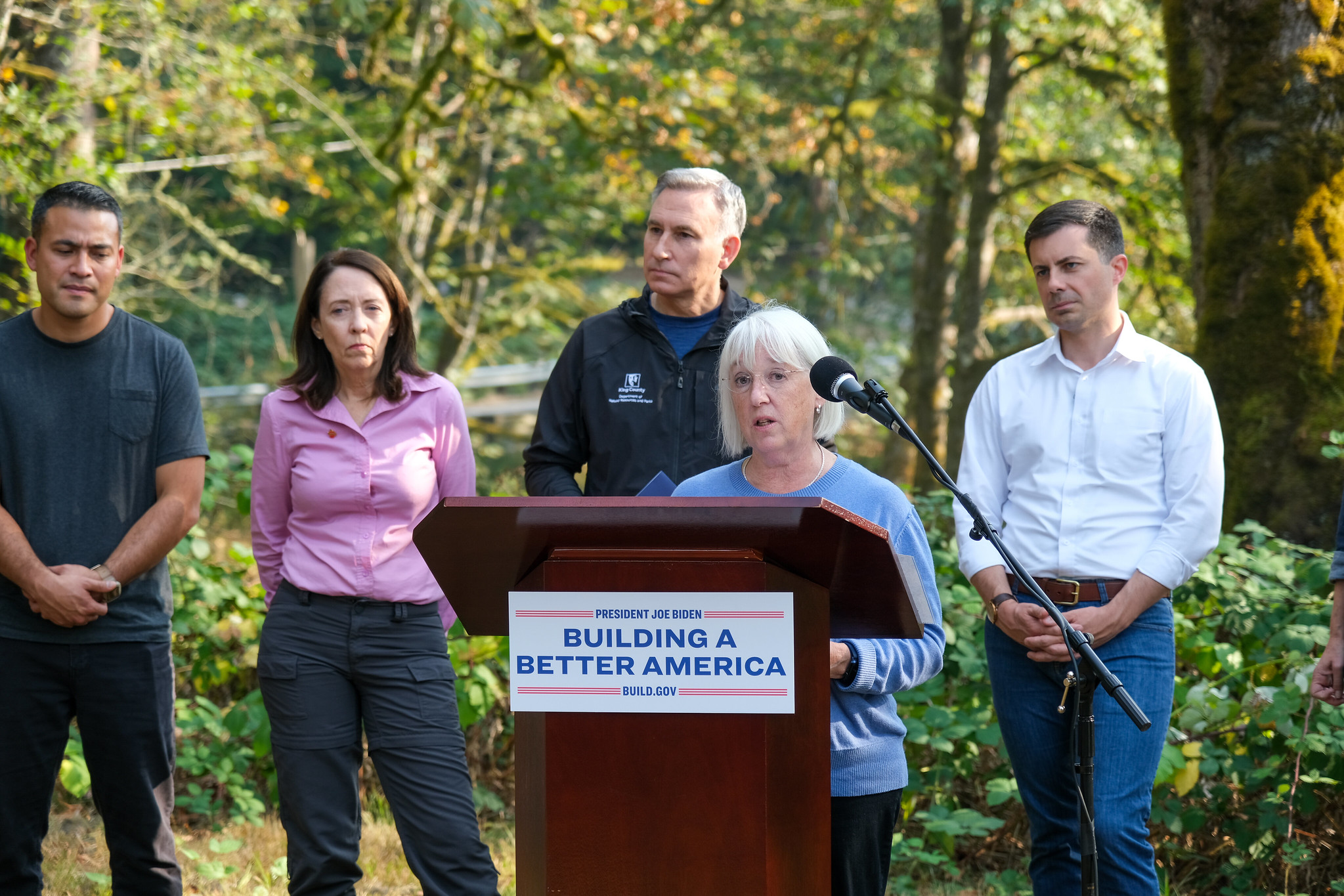$2.6 billion framework funded by Inflation Reduction Act builds on $74.4 million in NOAA Climate-Ready Coasts funding for WA state largely from the Bipartisan Infrastructure Law
Senator Murray played a key role in pushing the Biden administration to deliver a spend plan that prioritizes Washington state’s needs
Senator Murray: “I’ve spoken with Secretary Raimondo repeatedly about how funding for climate resilience and coastal communities is absolutely essential for Washington state—and I’m pleased to see that NOAA’s spend plan includes enormous investments in salmon recovery, coastal resilience, and Tribes that will enable our state to punch above its weight when it comes to securing federal funds.”
Washington, D.C. – Today, U.S. Senator Patty Murray (D-WA), Chair of the Senate Appropriations Committee, applauded the National Oceanic and Atmospheric Administration’s (NOAA) announcement of a $2.6 billion framework to invest in climate readiness and protect coastal communities, funded by the Inflation Reduction Act Senator Murray helped pass. The $2.6 billion framework, or “spend plan,” announced by NOAA will support people and communities on the frontlines of climate change—and includes a $390 million set-aside for Tribal communities across the country.
As part of the plan and other funding provided to NOAA in the Inflation Reduction Act, NOAA also announced $90 million for the new Northwest Fisheries Science Center in Seattle, $15 million for the Pacific Coastal Salmon Recovery Fund, $3 million to support facilities at the Olympic Coast National Marine Sanctuary, $27 million for Pacific salmon research, $185 million for a pilot program that expands and modernizes stock assessments to pilot new technologies and account for climate change, and other critical funding opportunities for Washington state. As NOAA drafted its spend plan, Senator Murray worked hard to ensure the Biden administration took the priorities of Washington state into full consideration, speaking directly with multiple administration officials to advocate for salmon recovery and Washington state’s Tribes in particular.
The historic $2.6 billion investment in climate resilience will help ensure that coastal communities—especially Tribes and vulnerable populations—have the resources and support they need to prepare, adapt, and build resilience to weather and climate events. The funding will also go towards strengthening workforce development and investing in marine resources, nature-based solutions, conservation, regional partnerships, and Tribal priorities.
The funding comes on top of $562 million in Climate-Ready Coasts awards announced in April that were funded by from the Bipartisan Infrastructure Law Senator Murray helped pass. Of the $562 million announced, $74.4 million went to Washington state — making Washington the biggest recipient in the nation for Climate-Ready Coasts funding from the Bipartisan Infrastructure Law to date.
“I’ve spoken with Secretary Raimondo many times about how funding for climate resilience and coastal communities is absolutely essential for Washington state—and I’m pleased to see that NOAA’s spend plan includes enormous investments in salmon recovery, coastal resilience, and Tribes that will enable our state to punch above its weight when it comes to securing federal funds,” Senator Murray said. “Our coastlines, salmon, and marine habitats are absolutely central to Washington state’s economy and culture, which is why I fought tooth and nail to secure this funding in the Inflation Reduction Act, including nearly $400 million set aside for Tribal communities. This once-in-a-generation investment will help coastal communities and Tribes prepare, adapt, and build resilience to climate change—and I will be watching closely and working hand-in-hand with partners on the ground to make sure this funding gets to Washington state and is implemented as intended.”
The $2.6 billion framework includes funding for the following programs:
- $390 million for Tribal Priorities to support habitat restoration, fish passage, capacity building, science, fish hatcheries, and Pacific salmon recovery. This includes $60 million for high priority deferred maintenance for Mitchell Act hatcheries in the Columbia River Basin, and a $240 million Tribal set aside for non-Mitchell Act Pacific salmon hatcheries.
- $575 million for Climate Resilience Regional Challenge: NOAA will fund a new competitive grant program that will invest in holistic, collaborative approaches to coastal resilience at regional scales. Details will be available in early summer.
- $349 million for Climate-Ready Fisheries, including $185 million for a pilot program that expands and modernizes stock assessments to account for climate change and $164 million for projects to protect region-specific fisheries and protected resources. This funding will help conserve fisheries and protected species in coastal regions around the country and enable NOAA to build dynamic fisheries management systems.
- $100 million for Climate Resilience Accelerators: NOAA will fund a new competitive business accelerator program to fill a critical unmet market need. These accelerators will support businesses with coastal and ocean-based resilience products and services related to NOAA’s mission as they navigate commercialization pathways. Details will be available in early summer.
- $60 million for Climate-Ready Workforce: NOAA will fund a new competitive grant program to fund training and ensure direct hire or promotion into jobs related to building a climate-ready nation, especially to benefit underserved communities. Details will be available in early summer.
The framework also includes $555 million in additional funding for high-quality project applications received through the Bipartisan Infrastructure Law competitions, $100 million in non-competitive funding for the Integrated Ocean Observation System which will in part support the work of the Northwest Association of Networked Ocean Observing Systems (NANOOS) based at the University of Washington, and $81 million in Technical Assistance on climate resilience to states, localities, Tribes and other partners, and more.
###


